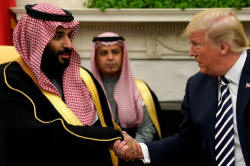Trump says Saudis must compensate for drop in Iran oil
supply
 Send a link to a friend
Send a link to a friend
 [July 02, 2018]
By Jeff Mason [July 02, 2018]
By Jeff Mason
BERKELEY HEIGHTS, N.J. (Reuters) -
President Donald Trump lashed out at OPEC with a warning to stop
manipulating oil markets and piled pressure on U.S. ally Saudi Arabia to
raise supplies to compensate for lower exports from Iran.
Trump said in a tweet on Saturday that Saudi Arabia's King Salman bin
Abdulaziz Al Saud had agreed to produce more oil.
The White House later walked back the president's comments, saying the
king had said his country could raise oil production if needed.
On Sunday, in an interview with Fox News' "Sunday Morning Futures with
Maria Bartiromo," Trump reiterated his call on Saudi Arabia to raise
production to a new record, arguing that it should help the United
States lower fuel prices since Washington is helping Riyadh in its
struggle against Tehran.
"Donít forget the one negative to the Iran deal is that you lose a lot
of oil, and they got to make up for it. And who is their big enemy?
Iran. OK. You think of it. Iran is their big enemy, so they are going to
have to do it," Trump said.
"And I have a very good relationship with the (Saudi) king and with the
crown prince of Saudi Arabia and with the others around and they are
going to have to put out more oil."

Oil prices rose last week on worries that U.S. sanctions against Iran
would take away significant volumes of crude oil from world markets
while oil demand worldwide increases.
Earlier this year, to the chagrin of European partners, Trump said he
would pull the United States out of the Iran nuclear agreement secured
by world powers.
On Monday, Brent oil prices <LCOc1> were around 1 percent lower but not
far from $79 per barrel as analysts have warned of thin global spare
capacity to offset potential supply disruptions.
Rising gasoline prices could create a political headache for Trump ahead
of the November elections by offsetting Republican claims that his tax
cuts and rollbacks of federal regulations have helped boost the economy.
On Fox, Trump directed blame at the Organization of the Petroleum
Exporting Countries, of which Saudi Arabia is the biggest producer.
Asked whether someone was manipulating oil markets, Trump said: "100
percent. OPEC is and they better stop it because we're protecting those
countries, many of those countries."
[to top of second column] |

U.S. President Donald Trump shakes hands with Saudi Arabia's Crown
Prince Mohammed bin Salman in the Oval Office at the White House in
Washington, DC, U.S. March 20, 2018. REUTERS/Jonathan Ernst/File
Photo

"OPEC is manipulating, and you know they allowed (a production increase) less
than we thought last week. They have to put out another 2 million barrels in my
opinion, because we donít want that happening," Trump said.
Trump was referring to OPEC's decision to raise output together with its
non-OPEC allies by around 1 million barrels per day, although since then Saudi
Arabia has pledged to raise production to a new record.
Saudi Arabia has been pumping around 10 million bpd in recent months and sources
close to its oil policy have said it could raise output to 11 million bpd.
Trump's suggestion means he wants Riyadh to increase production to 12 million
bpd - something the kingdom has never done in the past.
Trump will visit Europe this month for a meeting with NATO allies, whom he has
criticized sharply as paying too little for their joint defense.
Trade tensions are likely to overshadow that trip. Trump has imposed tariffs on
steel and aluminum in response to what he calls unfair trade practices from
Europe, Canada, and other allies around the world, who have responded with
retaliatory sanctions in kind.
On trade, the president said in the Fox interview that he was not happy with the
North American Free Trade Agreement and would not agree a new one until after
the November elections.
"I want to wait until after the election," he said.
(Reporting by Jeff Mason; Additional reporting by Kevin Drawbaugh in Washington;
Writing by Dmitry Zhdannikov; Editing by Nick Zieminski and Dale Hudson)
[© 2018 Thomson Reuters. All rights
reserved.] Copyright 2018 Reuters. All rights reserved. This material may not be published,
broadcast, rewritten or redistributed.
Thompson Reuters is solely responsible for this content.
 |